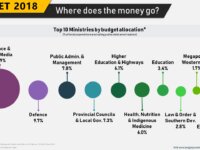Conçus et impulsés par Etalab, Datactivist et Vraiment Vraiment dans le cadre de la démarche de gouvernement ouvert en France, le forum « Open d’État » est une rencontre entre agents publics impliqués dans des projets d’innovation, et des acteurs de la société civile (acteurs privés, associations, ONG…) lors de forums ouverts sur des projets spécifiques autour de la donnée. Ces Forums permettent d'expliquer les projets et de recueillir les demandes des citoyens.
Innovation Tag Opengov: open government
Case Study
Ensuring Impartiality through Identity-Neutrality Provisions: the Case of Freedom of Information in…
The Internet has facilitated online services for citizens, but it has also facilitated Internet searches of service-seeking citizens by public officials, triggering conscious or unconscious bias. Via freedom of information (FOI) requests, academics provided evidence of this phenomenon at work. Brazil's Comptroller General (CGU) responded by implementing a check-box in its online FOI requesting system so that requesters could choose to remain anonymous. This innovation is a first for FOI regimes.
With the drafting of its first Constitution, Mexico City had a great opportunity: to explore innovative ways of crowd-sourcing this historic document, setting an example to other cities in the world on how to design important democratic experimentation at the scale of a megalopolis. The result of the entire Constitutional process is a forward-thinking document with progressive social policy and human rights at its heart. It became a legal reality in September 2018.
‘Budget Promises: Beyond Parliament’ is Sri Lanka’s pioneering budget monitoring platform, created to answer two basic questions about the government’s annual budget – 1) is the government doing what they are saying? and 2) is the government saying what they are doing? Since its launch, the platform has been a primary source for citizens, media, and researchers to track progress on budget promises.
The Open Data Policy of the Federal Executive Branch was established by the Decree N. 8.777/2016. Besides establishing the possibility of requesting public databases, the policy sets up the obligation for each body to draw up an Open Data Plan (PDA), which systematizes the planning for the opening of public data. The CGU monitors (through www.paineis.cgu.gov.br/dadosabertos) around 230 federal agencies covered by the decree, establishing regular and customized contact with public managers.
As one of Open Government Partnership’s co-founders, Brazil has developed a new co-creation methodology to define the commitments of its National Action Plans (NAP). It has envisaged co-creation workshops with parity participation of experts from government and civil society in chosen themes. The initiative aimed to conciliate the watchful eye of civil society’s representatives and the technical eye of those actors who live the reality of the state administrative machinery to set…
In 2015, a constitutional reform on transparency allowed the INAI to propose a specific set of actions to adopt and institutionalize open government principles in Mexico. Thus, it designed a comprehensive strategy that mainly consisted of the implementation of provisions, methodologies and public policies to guide and articulate the design, implementation, and operation of open government in public institutions, the three levels of government and the three branches of government nationwide.
The Regione Emilia-Romagna has, since 2014, developed a pilot strategy to promote and coordinate the use of social media by local police departments.
Keeping in touch with citizens is the core business of every local police, but today, traditional communication tools and skills are not enough to respond to citizens' needs and demands.
As such, we established a network of people inside local police departments to share expertise in the area of social media.


